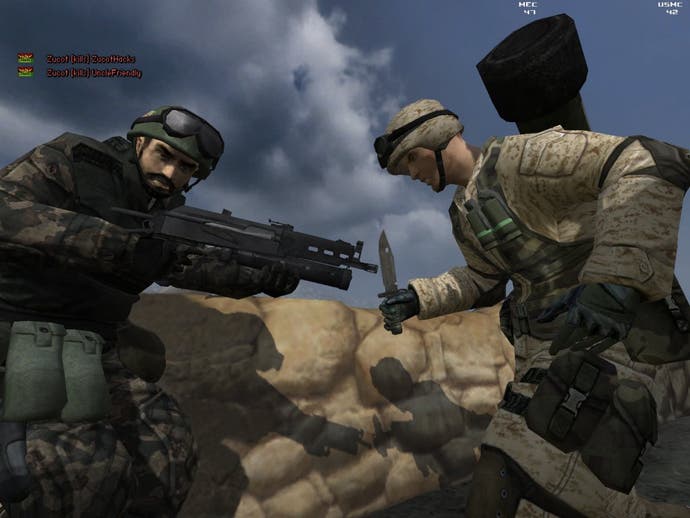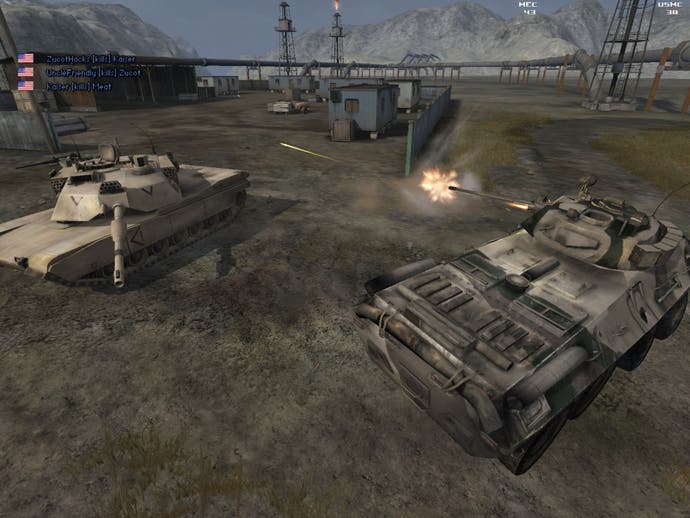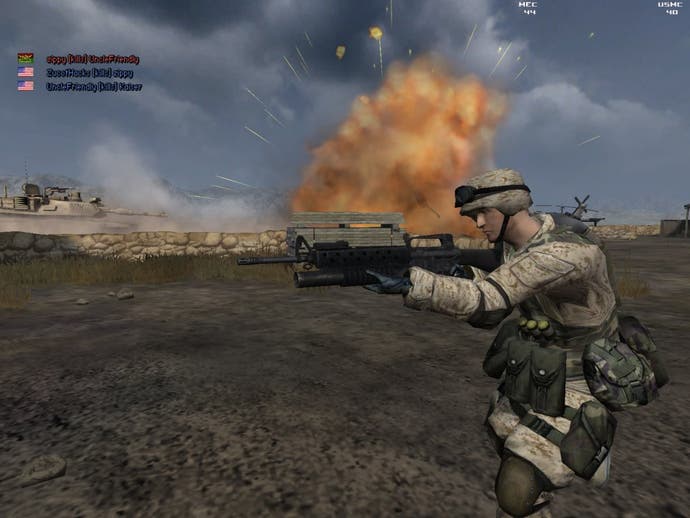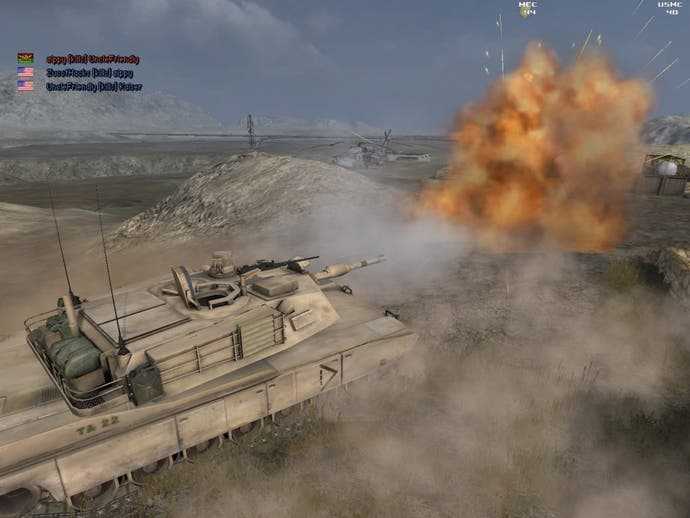Battlefield 2
Don't bring a gun to a tankfight. Except an anti-tank gun. That's okay.
If Battlefield has a fault, then it's that it doesn't spew golden coins from the top of your monitor when you play it. More realistically, it's that as a multiplayer game which opened up its code to the community, inclusions in the latest edition are things we might have already seen (and become overly familiar with) in a mod capacity. If it wasn't for Desert Combat, the modern setting alone would be enough to make people queue up to reenlist in a Battlefield sequel. As it is, we're a little harder to impress. Basic limitations like a smallish selection of maps and that there's only one game mode included also makes hackles rise. It's lucky that the beauty of Battlefield is in the details.
Obviously, technologically the game's a huge step forward. Graphical fidelity is one thing, but its things like the vehicle's physics which really impress. The sensation of skidding a buggy down a side road while trying to get the hell out of there before a tank manages to turn its turret on you is absolutely impeccable. Speaking generally, the vehicle additions like expanded-used helicopters and fighter jets add to the tactical possibilities of the conflict. Admittedly, until you master them, these tactical possibilities mainly involve crashing into a hilltop at high speed, but that's beside the point. Oh - and a quick note to everyone. Do master both of the flying machines before trying it on an open server, because if you don't and I'm in it when you crash, I'll explode your head with my enormous telekinetic powers. Truth.
Three sides are included: the popular US Marines, a Middle-East coalition and top-commies China. For ease of play and to help reinforce American feelings of fear and vulnerability, they have fairly equivalent powers. Most interesting are the character classes which you get to play. Seven are included, with a skillset expanded from previous games. We have Special Forces (Best thing: Satchel charges), Assault (Best thing: Under-gun grenade launcher), Snipers (Best thing: Oh, use your head), Engineers (Best thing: If they're doing their job, fixing stuff. If they're moonlighting, anti-tank mines), Medics (Best thing: Being the ibuprofen dispenser which walks on two legs) and Support (Best thing: Er… well, we'll get back to that one. Perhaps that the Machine Gun makes a nice noise?).

Some specific additions to some characters, like Medics being able to resuscitate a fallen comrade if they get to their corpse within a time limit, are absolutely golden. It introduces a great axis for this support class, where you balance between the possibility for heroism and the very real risk to your neck. After all, getting to a body which has just been killed implies that there's someone around who could easily do the same to you.
The biggest fundamentals are the addition of a Commander and Squad command level. If you join a squad, you gain the ability to respawn where the leader is, as well as receive waypoints and other commands from the leader. It's absolutely a boon in continuing assaults against a position, and an implicit encouragement for team play, especially with the built-in voice communication in a squad. While also existing on the map, the Commander's real role is to abstractly co-ordinate the battle on the strategy map, ordering scans, deploying the UAV to reveal enemy in a locale and choosing targets for the batteries. That each of these resources can be taken out (and later repaired, reactivating them), adds another consideration to the conflict.
Also intriguing is a small element of persistence to the game, where your performance and abilities are tracked as long as you play on certain ranked servers. While much of this is just to keep track of your performance, there's also an element akin to experience points. Perform decently and they'll accumulate, and unlock optional alternate weapons for classes. While it's an interesting motivation to play more, you have to note that it undermines the level playing field of the game slightly, in that people who play longer don't just have more approaches open due to their increased knowledge of the game, but necessarily due to their increased arsenal. Whether this is a welcome move to encourage people to play more or something which hurts newcomers will depend on whether the unlocked weapons' balancing makes them an interesting alternative or actually better. Perhaps in the longer term, the basic accumulation of medals - awarded as you perform well - will be what we see in more games. While basically just gold stars for a good pupil, having the game recognise your performance with an award is actually a very nice touch.

But is it any good?
A problem when reviewing any purely competitive multiplayer game is that you can feel a little useless. It's not as if when talking about chess anyone spends much time talking about the relative merits of the pieces ("The Knight is overpowered, with his frankly ludicrous teleport ability. And the King's been nerfed. I mean, what's this one square at a time crap?"), but that's what's generally demanded when talking about these sort of games. To choose a real world example, a kickabout in the park is only good relative to the people who you're playing with. Play with a group of Bigger Boys (Copyright Schoolyard conversations circa 1950) with a tendency to tackle at groin height, and it's rubbish.
With this in mind, when reviewing a game like Battlefield 2, you should essentially be answering three distinct questions:
1) At its highest level of play, with all its aspects working at an optimum, how fun is it?
2) How likely is that optimum play be reached?
3) And if it doesn't hit that optimum, how good is the likely level to be?

On the first point, Battlefield scores highly. Extremely highly. On a server packed full of humans, with a decent commander and motivated, organised squads it plays like an absolute dream. So hurrah for that.
But for the second point the probable answer is - outside of clan-based servers - not that likely. People are awkward little creatures. They won't co-operate and form neat, orderly regiments. They'll much more likely run off, jump in a vehicle that catches their eye, and head off towards the distance. The fact that Battlefield 2 is a more complicated game than the original means that there's much more information to process before you can even start to play optimally. While the original game's main strength was that despite the array of options, it was relatively accessible to pick up and play, Battlefield 2 can bemuse. And bemused people on a team-lead game just cause everything to grind to a halt.
Talking about grinding to a halt, there's a few technical niggles. The server browser has a tendency towards sluggishness, not actually operating anywhere as well as you'd hope. Similarly, it's extremely spec hungry, with some nasty frame rate drops. Equally, there have been some complaints of serious lag issues.
But despite this, on the third clause it still hits an admirably high level. As a commander or squad leader, with troops who don't follow your orders, it's easy to get dispirited. Don't. Despite the fact sixty-four people can be running around one of these maps, it's possible for a few individuals who have the presence of mind to consider their situation to change the destiny of a map. Take and hold an undefended point to allow your team to start respawning outside an awkward corner. Have an engineer reactivate your team's artillery or scanners to help plan the mission. Even if there's only one organised squad on a server, their focused drive changes the shape of the battle.

There have been conflicts where I've been part of the only squad on our side who appear to even thinking of a tactical level. But during those times, we didn't feel dispirited - we felt like an elite corps who knew what needed to be done and were the only men in this godforsaken army with the skills and ability to do it. When I finally dared step into the commander's boots on an open server, because nobody else was going to do so and my side was being thrashed so soundly it didn't matter if I messed up, it became clear how useful the position is even if barely anyone is paying attention. By scanning the battlefield and positioning artillery fire you can help slow down opposing thrusts against your troops, who may be entirely unaware how much you're saving their asses. And when it works, and you're the commander of an organised army… well, it's brilliant. While you may wish the controls for ordering were a little slicker and more sophisticated, since you can only set single waypoints rather than a multi-step route, increased sophistication may only alienate the squad commanders. Micromanaging troops in an RTS is one thing… but micromanaging actual people is a cause of real antagonism.
(Perhaps the most interesting thing about the Commander and Squad-leader roles is that, in a very real way, they demand actual charisma. My favourite squad leader utilised the voice-over-net systems regularly, and his caring, encouraging tones ("Get down, Medic! I need you alive, man") forged one of my favourite memories of BF2 so far.)
Best of all, despite the fact that play on an open server is never going to reach the optimum quality, the game's designed to encourage squad-based behaviour. For new people, you may join a squad just to get the extra spawn point, probably nearer the action. However, once you start to use it, and find yourself in an organised team, and see them moving from point to point and covering each other, it's a natural instinct to start to conform to their behaviour. And the second you start doing that, the game transmutes from a load of people just running around a map into something that feels like a real, tactical game which demands both mental and physical skill.
Battlefield has always been a contender in any serious debate about the best online shooter ever. This latest edition only helps cement that particular case.


